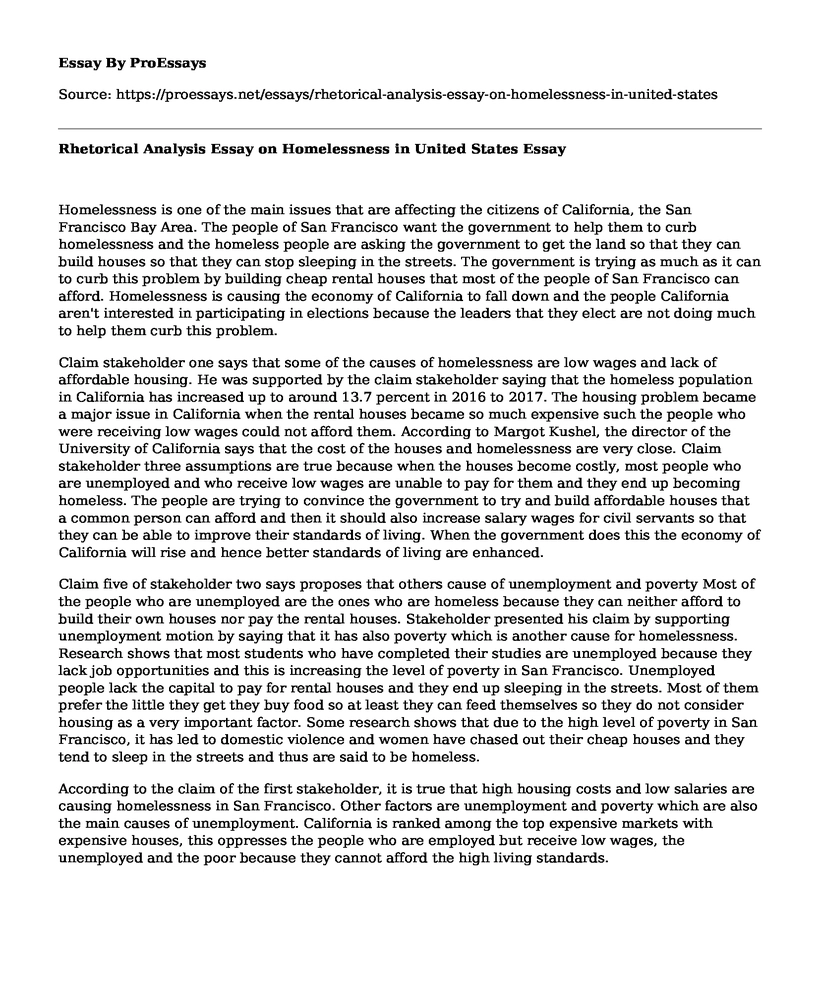Homelessness is one of the main issues that are affecting the citizens of California, the San Francisco Bay Area. The people of San Francisco want the government to help them to curb homelessness and the homeless people are asking the government to get the land so that they can build houses so that they can stop sleeping in the streets. The government is trying as much as it can to curb this problem by building cheap rental houses that most of the people of San Francisco can afford. Homelessness is causing the economy of California to fall down and the people California aren't interested in participating in elections because the leaders that they elect are not doing much to help them curb this problem.
Claim stakeholder one says that some of the causes of homelessness are low wages and lack of affordable housing. He was supported by the claim stakeholder saying that the homeless population in California has increased up to around 13.7 percent in 2016 to 2017. The housing problem became a major issue in California when the rental houses became so much expensive such the people who were receiving low wages could not afford them. According to Margot Kushel, the director of the University of California says that the cost of the houses and homelessness are very close. Claim stakeholder three assumptions are true because when the houses become costly, most people who are unemployed and who receive low wages are unable to pay for them and they end up becoming homeless. The people are trying to convince the government to try and build affordable houses that a common person can afford and then it should also increase salary wages for civil servants so that they can be able to improve their standards of living. When the government does this the economy of California will rise and hence better standards of living are enhanced.
Claim five of stakeholder two says proposes that others cause of unemployment and poverty Most of the people who are unemployed are the ones who are homeless because they can neither afford to build their own houses nor pay the rental houses. Stakeholder presented his claim by supporting unemployment motion by saying that it has also poverty which is another cause for homelessness. Research shows that most students who have completed their studies are unemployed because they lack job opportunities and this is increasing the level of poverty in San Francisco. Unemployed people lack the capital to pay for rental houses and they end up sleeping in the streets. Most of them prefer the little they get they buy food so at least they can feed themselves so they do not consider housing as a very important factor. Some research shows that due to the high level of poverty in San Francisco, it has led to domestic violence and women have chased out their cheap houses and they tend to sleep in the streets and thus are said to be homeless.
According to the claim of the first stakeholder, it is true that high housing costs and low salaries are causing homelessness in San Francisco. Other factors are unemployment and poverty which are also the main causes of unemployment. California is ranked among the top expensive markets with expensive houses, this oppresses the people who are employed but receive low wages, the unemployed and the poor because they cannot afford the high living standards.
Conclusion
According to the research of the United States, Housing and Urban Development says that around 134000 people in California are homeless. According to the claims of stakeholder one and stakeholder two they are similar because all of their claims cause homelessness. Low wages, unemployment are the key factors to homelessness. The important factor to understand is how to deal with problems that are causing homelessness. The questions that are left unanswered are how the government will help the people who are living in the streets due to lack of basic needs.
Works cited
Hickler, Benjamin, and Colette L. Auerswald. "The worlds of homeless white and African American youth in San Francisco, California: a cultural epidemiological comparison." Social Science & Medicine 68.5 (2009): 824-831.
Quigley, John M., Steven Raphael, and Eugene Smolensky. "Homelessness in California." (2001).
Stretch, John J., and Larry W. Kreuger. "Five year cohort study of homeless families: A joint policy research venture." J. Soc. & Soc. Welfare 19 (1992): 73.
Cite this page
Rhetorical Analysis Essay on Homelessness in United States. (2022, Dec 10). Retrieved from https://proessays.net/essays/rhetorical-analysis-essay-on-homelessness-in-united-states
If you are the original author of this essay and no longer wish to have it published on the ProEssays website, please click below to request its removal:
- Assessing Medicare's Hospital Pay-For-Performance Programs Article Review
- Essay on Confederate Statures and Historical Racism
- Rhetorical Analysis: "The Cultural Influence of Adolescent Prescription Drug Abuse"
- Paper Example on Gender Discrimination
- Shelter for Abused Women Essay Example
- My Strange Addiction: Unusual Behaviors and Struggles - Essay Sample
- Making Decisions with Data: Understanding Hypothesis Testing & Statistical Significance - Article Review Example







